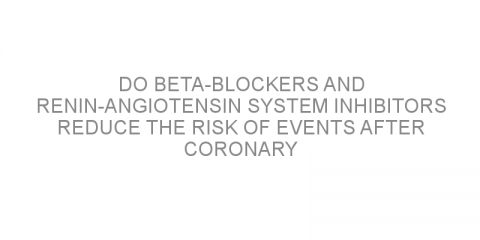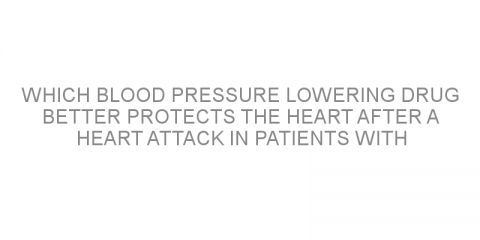In a nutshell This study looked at how beta-blockers affected patients following a heart attack. It found that patients using a low dose of beta-blockers had better outcomes one year later. Some background Following a heart attack, there are several treatment options available to improve outcomes. One treatment is beta-blockers (BBs), which prevent...
Read MoreA history of a heart attack-Yes, once Posts on Medivizor
Which beta blocker is best after a heart attack?
In a nutshell This study compared the use of two beta-blockers, carvedilol (Coreg) and metoprolol (Lopressor), after a heart attack. It found that they had similar results on most patient groups. However, carvedilol improved survival in patients with reduced heart function. Some background Beta-blockers are a group of medications that...
Read MoreDo beta-blockers and renin-angiotensin system inhibitors reduce the risk of events after coronary revascularization?
In a nutshell This study investigated if certain types of anti-hypertensive drugs (AHTs) reduce risks after revascularization procedures for a heart attack. They found that beta-blockers (BBs) and angiotensin-converting enzyme inhibitors/angiotensin receptor blockers (ACEIs/ARBs) reduce cardiovascular events (CVEs) after revascularization. Some...
Read MoreTicagrelor vs. prasugrel – which is more effective as a maintenance treatment after a heart attack?
In a nutshell This study compared ticagrelor (Brilique) and prasugrel (Efient) as a maintenance antiplatelet therapy (APT) after a myocardial infarction (MI; heart attack). They found that ticagrelor had a better APT effect and fewer bleeding events. Some background Coronary artery disease (CAD) is a condition that leads to...
Read MoreBiodegradable sirolimus versus durable everolimus stents – which is more effective after a heart attack?
In a nutshell This study investigated the effects of different drug-eluting stents (DES) in percutaneous coronary intervention (PCI) in patients who have had a heart attack. They found that biodegradable sirolimus (BS) stents were better than durable polymer everolimus (DPE) stents in improving blood flow. Some background Percutaneous...
Read MoreWhich blood pressure lowering drug better protects the heart after a heart attack in patients with diabetes?
In a nutshell The aim of this study was to compare the effectiveness of angiotensin-converting enzyme inhibitors (ACEI) and angiotensin II receptor blockers (ARBs) in protecting the heart in patients with diabetes that have had a heart attack and who had stents placed. The main finding of the study was that ACEI reduced the risk of major adverse...
Read MoreCombining clopidogrel and aspirin in coronary artery disease
In a nutshell This study investigated if clopidogrel (Plavix) and aspirin are effective when taken together for treating coronary artery disease (CAD). They found that clopidogrel and aspirin improved CAD symptoms compared to aspirin alone. Some background Coronary artery disease (CAD) is caused by reduced blood flow to the heart. This leads...
Read MoreWhat are the long-term outcomes of treatments for MINOCA disease?
In a nutshell This study aimed to investigate the long-term effects of different treatments for patients with myocardial infarction with non-obstructive coronary artery (MINOCA) disease. This study concluded that statins and ACE inhibitors/angiotensin receptor blockers provided long-term benefit to patients with MINOCA disease. Some background...
Read MoreCan using two inhibitors increase the risk of heart related events in diabetes patients?
In a nutshell This study aimed to investigate if using both an angiotensin converting enzyme (ACE) inhibitor and a dipeptidyl peptidase 4 inhibitor, alogliptin (Nesina) in type 2 diabetes mellitus patients with recent acute coronary syndrome led to increased risk of cardiovascular events. This study concluded there was no increased risk of...
Read MoreCan diabetic status help in determining adverse events of acute coronary syndromes?
In a nutshell This study aimed to determine the timing of mortality and other non-fatal adverse events according to diabetic status and type of acute coronary syndrome (ACS). It was found that the type of ACS but not the diabetic status determines the timing of fatal and non-fatal adverse events. Some background Patients with diabetes mellitus...
Read MoreWhat is the long-term risk of a stroke after a heart attack?
In a nutshell This paper studied the long-term risk of stroke in patients who have survived a heart attack. Patients were at increased risk of a stroke up to 30 years after a heart attack. Some background After a heart attack, about 2 to 4 in 100 patients have a stroke (not enough blood supply reaching the brain). A stroke can be ischemic...
Read MoreStatin treatment after a heart attack in elderly patients
In a nutshell This paper looked at effect of statin treatment after heart attack in elderly patients. Patients who started statin treatment did not have differences in cognition and physical abilities compared to patients who did not start statin treatment. Some background Statins are a group of drugs that work to reduce levels of...
Read More














